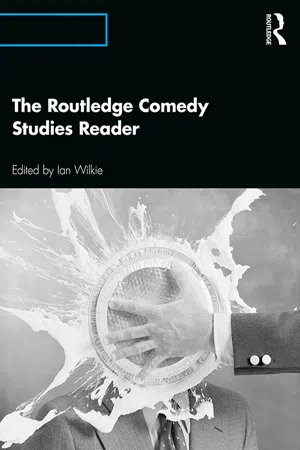
- 418 pages
- English
- ePUB (mobile friendly)
- Available on iOS & Android
The Routledge Comedy Studies Reader
About this book
The Routledge Comedy Studies Reader is a selection of the most outstanding critical analysis featured in the journal Comedy Studies in the decade since its inception in 2010.
The Reader illustrates the multiple perspectives that are available when analysing comedy. Wilkie's selections present an array of critical approaches from interdisciplinary scholars, all of whom evaluate comedy from different angles and adopt a range of writing styles to explore the phenomenon. Divided into eight unique parts, the Reader offers both breadth and depth with its wide range of interdisciplinary articles and international perspectives.
Of interest to students, scholars, and lovers of comedy alike, The Routledge Comedy Studies Reader offers a contemporary sample of general analyses of comedy as a mode, form, and genre.
Tools to learn more effectively

Saving Books

Keyword Search

Annotating Text

Listen to it instead
Information
Part I
Back to basics
What is comedy and where does it come from?
Chapter 1
Against Comedy (1:2)
1.
2.
3.
4.
5.
6.
Table of contents
- Cover
- Half Title
- Title Page
- Copyright Page
- Dedication
- Table of Contents
- Foreword by Ian Wilkie
- Acknowledgements
- PART I: Back to basics: What is comedy and where does it come from?
- 1. Against Comedy (1:2)
- 2. Thoughts on the current state of humour theory (1:2)
- 3. The origins of comic performance in adult–child interaction (1:1)
- 4. The science of baby laughter (4:2)
- PART II: Old comedy: Taproots and tropes
- 5. The time-travelling miser: Translation and transformation in European comedy (2:1)
- 6. Conflict and slapstick in Commedia dell’Arte – The double act of Pantalone and Arlecchino (4:1)
- 7. Clowns do ethnography: an experiment in long-distance comic failure (5:1)
- PART III: Class, gender, race: Reading comedy’s issues
- 8. ‘To what base uses we may return, Horatio!’ – Hamlet, Comedy and Class Struggle (4:2)
- 9. No other excuse: Race, class and gender in British Music Hall comedic performance 1914–1949 (3:1)
- 10. ‘Women Like Us?’ (3:2)
- PART IV: Doing comedy: Giving, receiving, causes and effects
- 11. Pretty funny: Manifesting a normatively sexy female comic body (4:2)
- 12. No greater foe? Rethinking emotion and humour, with particular attention to the relationship between audience members and stand-up comedians (5:1)
- 13. The roots of alternative comedy? – The alternative story of 20th Century Coyote and Eighties Comedy (4:1)
- 14. Life memory archive translation performance memory archive life: textual self-documentation in stand-up comedy (7:1)
- PART V: New comedy? Interviews with practitioners
- 15. Not the definitive version: an interview with Ross Noble (1:1)
- 16. Scenes in the House of Comedy: Interview with Stewart Lee (2:1)
- 17. Up and down with Barry Cryer: From an interview conducted on 22 July 2011 (2:2)
- 18. Interview with Charlie Hanson (3:1)
- 19. ‘Words are my weapons’: Tiffany Stevenson interview (3:2)
- 20. Russell Kane: Comic chameleon (4:2)
- 21. Les Dennis: Man out of time (4:2)
- 22. ‘Not a funny place to live’: An interview with Chris Rock (5:2)
- 23. A series of ghastly mistakes that turned out right in the end (8:1)
- 24. Interview with Kate Fox – stand-up poet (8:2)
- PART VI: Critical angles: Essays on a Joan Rivers routine
- 25. From toothpick legs to dropping vaginas: Gender and sexuality in Joan Rivers’ stand-up comedy performance (2:2)
- 26. Joan Rivers – Reading the meaning (2:2)
- 27. ‘A pleasure working with you’: Humour theory and Joan Rivers (2:2)
- PART VII: The world of comedy: Culture and satire
- 28. Obscenity, dirtiness and licence in Jewish comedy (5:2)
- 29. Satire in a multi-cultural world: a Bakhtinian analysis (9:2)
- 30. Silly meets serious: discursive integration and the Stewart/Colbert era (9:2)
- 31. The comedian, the cat, and the activist: the politics of light seriousness and the (un)serious work of contemporary laughter (6:1)
- 32. Borat, Sacha Baron Cohen, and the seriousness of (mock) documentary (6:1)
- PART VIII: New comedy? Emerging platforms and forms of expression
- 33. A book and a movie walk into a bar (6:2)
- 34. Kidding around: children, comedy, and social media (5:1)
- 35. A new economy of jokes?: #Socialmedia #Comedy (6:2)
- 36. Comedy meets media: how three new media features have influenced changes in the production of stand-up comedy (6:2)
- 37. The animated moving image as political cartoon (9:1)
- 38. Is vlogging the new stand-up? A compare/contrast of traditional and online models of comedic content distribution (9:1)
- Index
Frequently asked questions
- Essential is ideal for learners and professionals who enjoy exploring a wide range of subjects. Access the Essential Library with 800,000+ trusted titles and best-sellers across business, personal growth, and the humanities. Includes unlimited reading time and Standard Read Aloud voice.
- Complete: Perfect for advanced learners and researchers needing full, unrestricted access. Unlock 1.4M+ books across hundreds of subjects, including academic and specialized titles. The Complete Plan also includes advanced features like Premium Read Aloud and Research Assistant.
Please note we cannot support devices running on iOS 13 and Android 7 or earlier. Learn more about using the app